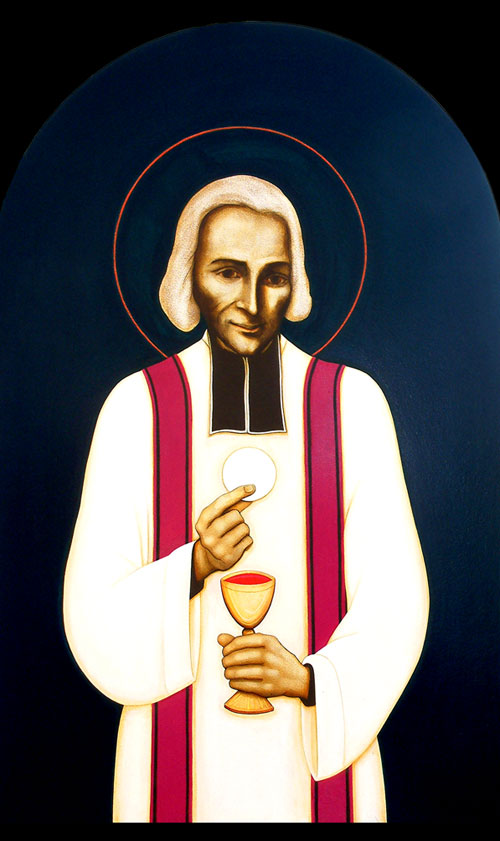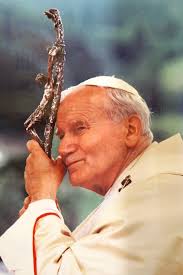(Here is a very fitting and a propos review and meditation on this Solemnity of the Sacred Heart from Father Marco Testa on Saint Jean Vianney, the Curé d’Ars, the patron saint of priests. As the good Curé put it, if we really understood the priest on earth, we would die, not of fright, but of love. And Christ’s Heart is the perfect priestly Heart, which suffered for the salvation of all men) Ed.
Coached by the Curé, Lessons in Shepherding with St. John Vianney
By Kevin Wells
Scepter Publishing Inc., 2025
ISBN: 978-1-59417-552-7
St. Teresa Benedicta of the Cross famously said that there is a providence of books. Her reading of the autobiography of the Spanish mystic St. Teresa of Avila was the catalyst for her conversion to the Catholic faith and the fulfillment of her Jewish heritage. It is no exaggeration to say that Coached by the Curé, Lessons in Shepherding with St. John Vianney is as providential a book for parents, grandparents, priests and anyone concerned with the salvation of those entrusted to their care, most especially the young people victimized by contemporary culture.
Kevin Wells masterfully presents St. John Vianney, the Patron Saint of priests as the Patron Saint of the Domestic Priesthood, of parents and grandparents and of anyone concerned with the numberless victims of the wolf of Modernism and the venomous lies of modernity. He does this masterfully, in the manner of a skilled and seasoned raconteur by taking on the voice of the humble Curé of Ars who from Heaven addresses a letter to Catholics today. In the Prologue, the author outlines the questions he will pose:
What, Curé, would you prescribe today for a troubled world and a Roman Catholic Church that over the past decade has lost many millions of its once-faithful sons and daughter? How would you encourage today’s parents and grandparents to begin to shepherd their fallen-away children back from the grip of Modernism? What measures would you take to inflame our hearts to return to the Sacred Heart of Jesus and begin to serve God alone? What, Curé, would you do to save this bleeding Church?
The answers to these questions form the content of this book of consolation and encouragement, a contemporary paraenesis written in the imagined voice of St. John Vianney by a former Major League Baseball writer, a husband and father whose love for his family, his Church, the priesthood and those most in need of God’s mercy resonates with every word of this masterful work. He gently diagnoses the ills of our modern secular and religious culture and provides an antidote available to anyone willing to live a virtue-driven life.
The book begins with an imagined dialogue in Heaven. Besides St. John Vianney and St. Philomena, the early Church Martyr who urges the saintly Curé to teach moms and dads to be priests in their homes, the interlocutors also include some of the more notable heavy hitters of the Catholic priesthood: Peter the first Pope, Patrick of Ireland, John Bosco, Maximilian Kolbe, Philip Neri, John Neumann, Damien of Molokai and Padre Pio. Their dialogue is a concise and I would say surgical analysis of our current culture in which the light of both divine truth and human reason seem to be failing. The saintly priests rightly reproach many of today’s priests who have genuflected to the world.
The first chapter alone, “The Dialogue of the Saints” is reason enough for every bishop and priest to obtain a copy of this book and meditate on its contents with humility and docility, and begin to reconsider and re-evaluate what is meant by the term pastoral as it is generally misunderstood and consequently misapplied today. The Curé teaches us that being pastoral does not mean that priests should have little or no regard for the law of God and of the Church and so become indulgent and mute in the face of sin. Being pastoral means that a priest must possess and foster in himself a paternal impulse to save souls at any cost. In this regard, the generosity of the Curé in undertaking penance and self-denial for the sake of others serves as an example for priests and parents alike. The Curé understood experientially that the economy of salvation is real; and that in the union of the Mystical Body of Christ, the holiness of one benefits others in a way far exceeding the harm which the sin of one has inflicted on others. As Pope John Paul taught, there are people who leave in their wake a surfeit of love, of suffering borne well, of purity and truth, which involves and sustains others. This was true of the Curé and it can be no less true of anyone who resolves to live with a spirit of sacrifice that brings hearts to conversion.
The chapters that follow present perennial themes essential for a fruitful and fulfilled priestly life and for a devout Christian life that seeks conformity to Christ and transformation in Christ as the ultimate desired goal of Christian discipleship. In the voice of the Curé, Kevin Wells touches on contemporary challenges faced by anyone who wishes to follow Our Lord in the midst of a fallen and broken world. The reader is introduced to the life of this saintly parish priest and to his heroic practice of the virtues that we all need in order to respond to the demands of Christian discipleship authentically and generously.
Each chapter focuses on a particular virtue or practice that enabled the Curé to conform himself more perfectly to Jesus Christ, Priest and Victim. Drawing from examples and events from the life of this Saint, the reader is introduced to the importance of the foundational Christian virtues of humility and fortitude, the primacy of prayer and the importance of devotion to Our Lady, Mother and Queen. The theology of sacrifice as it concerns the Mass and Christian life permeates the book because it was the operative theology of the life of St. John Vianney, and in turn, this theology informed his anthropology. Parents and educators do well to take note of this. Although this is a traditional teaching, for many readers it may be their first encounter with the key to understanding and bringing about an integrated approach to a life of meaning and purpose inspired by the Eucharistic Sacrifice. As the Catechism of the Catholic Church expresses it, we live as we pray because we pray as we live.
Every chapter ends with a scriptural reference from the gospels, questions for reflection and points for meditation. The invitation to reflection is gently made by the Curé, whose words reveal the author’s familiarity with the events of the life and virtues of a Saint that we do well to rediscover or perhaps come to know for the first time. The traditional spirituality of the Curé, a spirituality of self-denial, sacrifice and generosity lived out joyfully and in a spirit of penance will transform disciples of Christ, lay or clerical into fervent and mature men and women who become spiritual mothers and spiritual fathers concerned with the salvation and good of souls. The salvation of souls was the overriding concern of the Curé of Ars because it is the supreme law of the Church. Salus animarum suprema lex.
Nevertheless, many Catholics today labour under the dangerous and potentially fatal presumption of assured salvation. All the more reason to heed the example of saintly pastor of Ars who for the sake of his flock heroically embraced the kenosis that all priests promise to God at ordination and that a husband and wife similarly promise in the sacrament of marriage. Self-giving, self-sacrificing love is the only measure that can fulfill us because it is the very Love that has created and redeemed us. St. John Vianney understood this and he sought to bring everyone he could to this saving knowledge. When we appropriate these truths, they become a reality in us and consequently, we are transformed into the likeness of Christ. The last chapter of the book, Chapter 8 is especially helpful as an introduction to contemplative prayer and the transforming union that the mystics expound upon and which Kevin Wells succeeds in presenting with clarity and simplicity. To be sure, we are given a glimpse of the author’s luminous interior life.
Coached by the Curé, we can shepherd ourselves and others to Heaven. The value of this book as a trusted vade mecum for ourselves and in support of others cannot be overstated. The path we take is the path of devout humility that Our Lord Himself became for us; and that St. John Vianney and every other Saint necessarily also becomes as we shepherd others to Heaven. Parents, grandparents, educators, priests and bishops would do well to read and share this book with others far and wide. There’s much more that can be said but Kevin Wells says it much better. Read this book.












